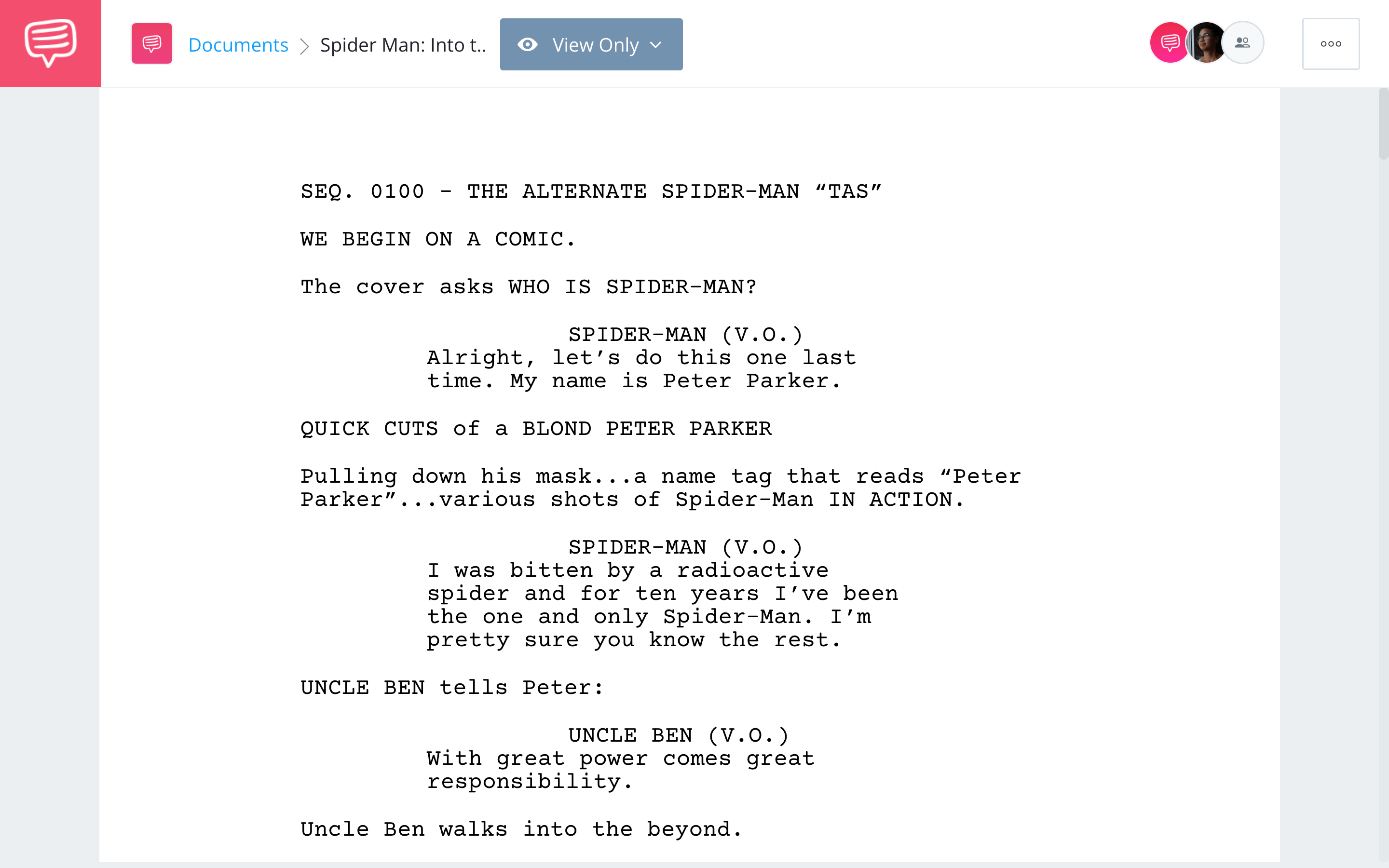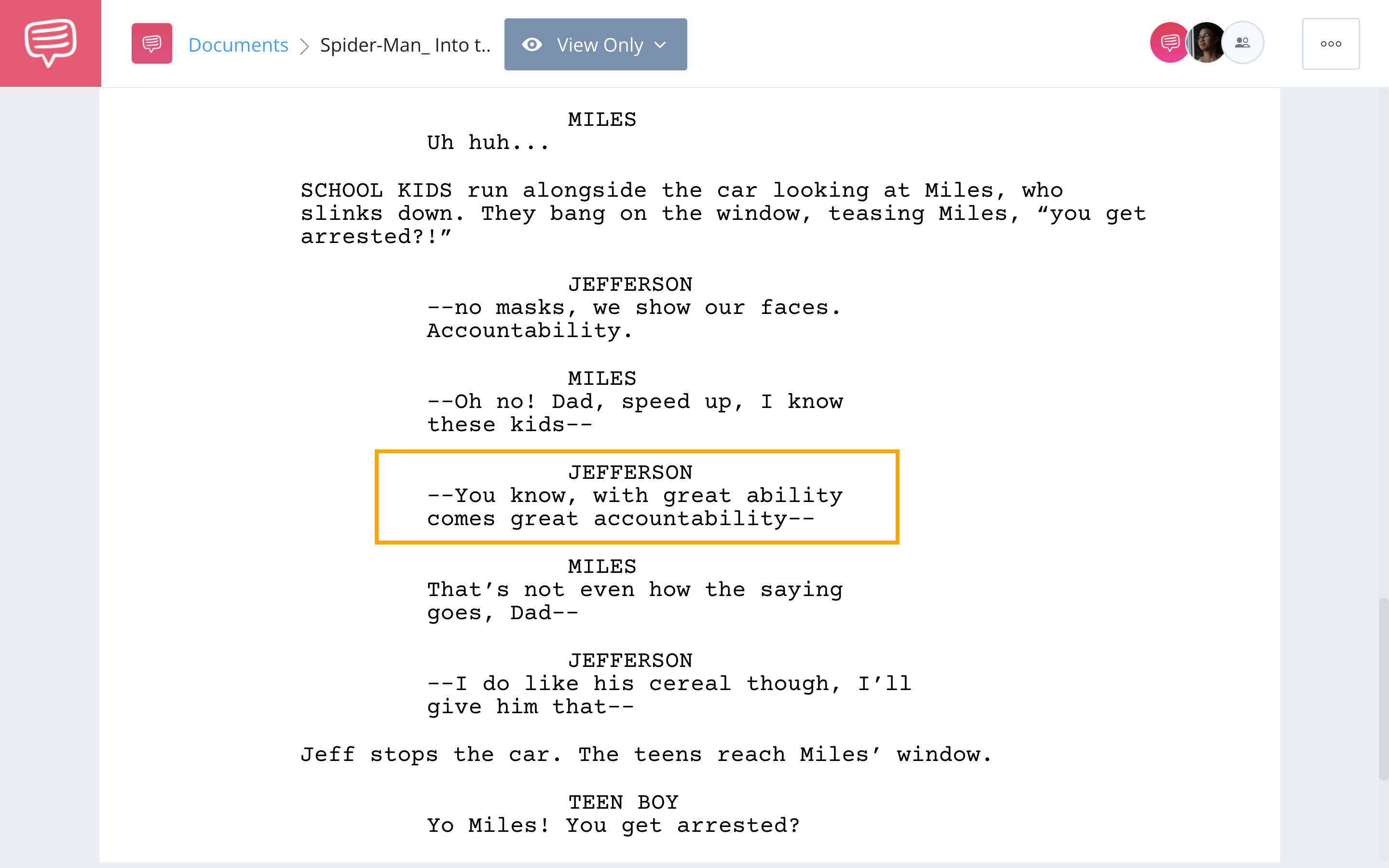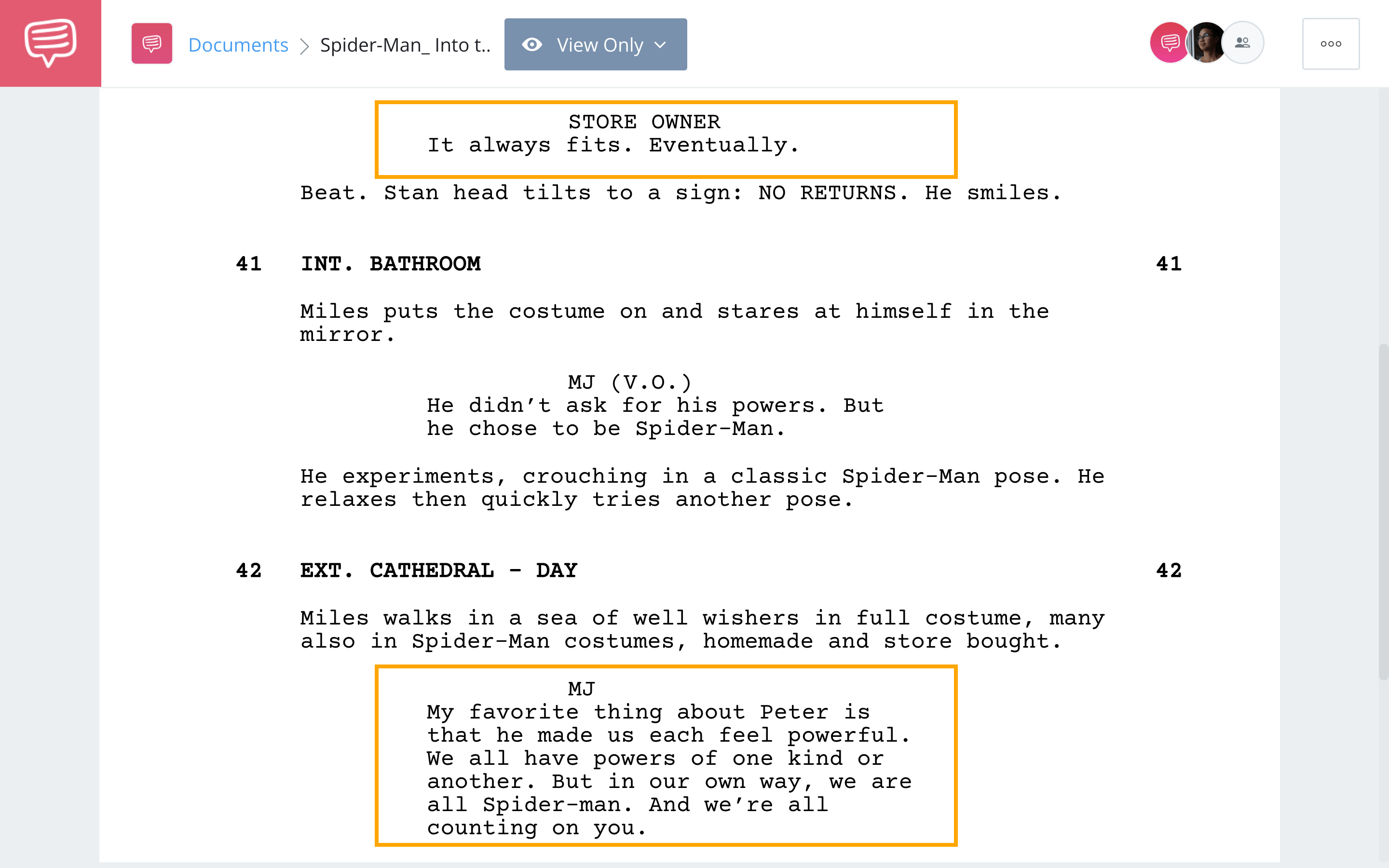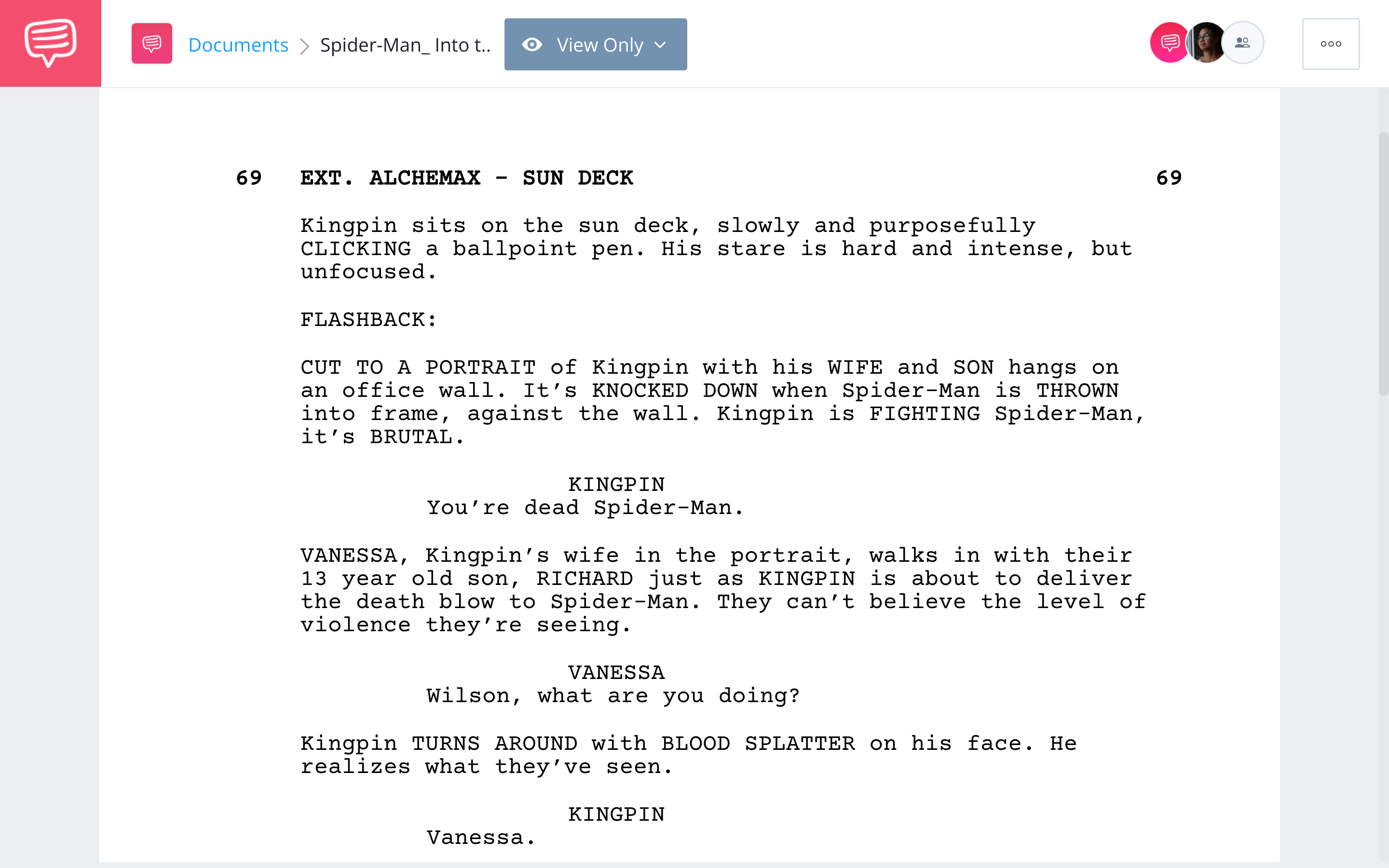Spider-Man: Into the Spider-Verse is a breath of fresh air in the superhero genre. It exists outside of the tightly-controlled Marvel Cinematic Universe, and it uses its freedom to pursue a thrillingly original take on the thrice-rebooted hero we thought we’d seen every angle of. Spider-Verse’s originality doesn’t solely come from its stunning animation (though that helps). Its story is an achievement in creativity, at once recreating Spider-Man while also paying postmodern homage to his many iterations of yore.
The Spider-Man: Into the Spider-Verse screenplay moves a mile a minute and is touching, hilarious, and action-packed. By dissecting the script’s structure, themes, quotes, and characters, we’ll show you how the writers pulled it off and how you can, too.
WHO WROTE Spider-Man: Into the Spider-Verse SCRIPT?
Written by Phil Lord, Rodney Rothman
Phil Lord is a writer/director whose works include Cloudy with a Chance of Meatballs, The Lego Movie, 21 Jump Street, and 22 Jump Street, all of which he made with his filmmaking partner Christopher Miller.
Rodney Rothman is a writer, producer and director who has written the films Grudge Match and 22 Jump Street, and the book Early Bird: A Memoir of Premature Retirement. He co-directed Spider-Man: Into the Spider-Verse.
STORY BREAKDOWN
STRUCTURE OF SPIDER-MAN: INTO THE SPIDER-VERSE SCREENPLAY
Here is the story structure for Into the Spider-Verse script:
Exposition
We’re reintroduced to the Spider-Man we know and love. Then we’re introduced to Miles Morales: a teen struggling to get along with his demanding cop dad. He’d prefer to graffiti with his uncle rather than go to his stuffy school.
Inciting Incident
While Miles is graffitiing with his Uncle Aaron, he gets bit by a glitched-out spider.
Plot Point One
Miles watches Spider-Man battle Kingpin over a Super-Collider. Spider-Man dies, but not before giving Miles a flash drive that can disable the treacherous machine.
Rising Action
The use of the Super-Collider has brought another, disheveled Spider-Man (Peter B. Parker) into Miles’ dimension. The two decide to take down the Collider together. They fight Doc Ock and are joined by Gwen Stacy, Spider-Woman.
Midpoint
Upon visiting Aunt May’s house, the Spideys realize there are more Spideys: they all decide to unite.
Plot Point Two
After more battles and the devastating loss of Miles’ uncle (who turned out to be Prowler), Peter B. Parker decides Miles isn’t ready and leaves him tied up in his dorm.
Build Up
Miles forces himself to control his powers, escapes Parker’s bondage, and makes his way to the collider, where all the Spider-People are fighting Kingpin and his henchmen.
Climax
Miles tells Peter B. Parker he has to leave his dimension like the others did, and let Miles fight Kingpin on his own. Parker relents.
Finale
Miles defeats Kingpin, destroys the Collider, and makes up with his dad. He embraces his role as the new Spider-Man.
Spider-Man: Into the Spider-Verse Script Takeaway #1
Into the Spider-Verse Quotes
Part of what makes the Spider-Man: Into the Spider-Verse script stand out is its comedy. Phil Lord in particular has proven comedy chops, having co-written 21 Jump Street and The Lego Movie, and they are on full display in this film.
Some of the greatest jokes in the Into the Spider Verse script come from self-referentiality, or meta-humor: referencing the medium and IP within which the story takes place.
meta DEFINITION
What is meta?
Meta is a prefix meaning comprehensive or transcending. Describing a creative work as “meta” means that it references itself or the conventions of its genre/medium.
For example, a character in a TV show saying, “It’s not like we’re in a TV show.”
With a character as well-known as Spider-Man, this is a great choice for humor, since these are winking inside jokes that most viewers are in on. Let’s take a look at one of the most successful examples of the in-joke in the Into the Spider Verse script, which we imported into StudioBinder’s screenwriting software. Be sure to click on the image to read the scene in its entirety.
Spider Man Into the Spider Verse quotes
Here we see Jefferson, Miles’ dad, butcher the most famous quote from the Spider-Man universe: “With great power comes great responsibility.”
His alteration, “with great ability comes great accountability,” relies on a viewer’s outside knowledge of Spider-Man (it’s a very funny deflation of the original line), but it also works for someone who’s never seen Spider-Man. It might not be as effective as a joke for the uninitiated, but it still gets across Jefferson’s character: he’s a rule follower, a by-the-book no-BS cop.

A divide between father and son • Spider Man Into the Spider Verse screenplay
This scene, while efficiently establishing Jefferson and his relationship with his son, also establishes just how large of a presence Spider-Man is in this fictional New York. We’ve already had the opening montage, which skewers Spidey oversaturation, and this scene hammers it home. Even Jefferson, who has an outspoken hatred of Spider-Man, A) knows the superhero’s most famous origin story quote (kind of), and B) likes his cereal.
In Miles’ and Jefferson’s world, Spider-Man is unavoidable. This makes Spider-Man’s stature seem all the more inaccessible to someone like Miles, just your average kid. Once there is the possibility of Miles becoming Spider-Man, we as an audience know the weight that carries.
Thus, the meta-jokes serve two purposes: humor and world-building. Spider-Man’s cultural dominance is a key part of the Into the Spider-Verse script’s world, just like how Marvel’s cultural dominance is a key part of our world.
There are tons of other great lines from the script that utilize meta-comedy, and a bunch of great lines which stand on their own. Here’s a few Spider Man Into the Spider Verse quotes:
- Spider-Ham: “That’s all, folks.” Peter B. Parker: “Is he allowed to say that? Legally?”
- Miles: “With great power comes great…” Peter B. Parker: “Don’t you dare finish that sentence! Don’t do it. I’m sick of it.”
- “It always fits. Eventually.” – Stan re: Miles’ Spider-Man costume.
- “Miles, the hardest thing about this job is you can’t always save everybody.” – Spider-Ham
- “It’s a leap of faith. That’s all it is, Miles. A leap of faith.” – Peter B. Parker
Spider-Man: Into the Spider-Verse Script Takeaway #2
Themes in the Spider-Verse
Perhaps the most powerful aspect of Spider Man Into the Spider Verse plot is its core theme: anyone can be a hero.
The superhero genre, by its very nature, is one which follows a Great Person logic. Superheroes can break laws, skirt conventions, and save the world because they’re, well, better than the rest of us.
Spider-Verse is a departure from this line of thinking. What if Spider-Man wasn’t just one guy, but rather an idea?
This theme is furthered by the references to other Spider-Man IP (as discussed in the previous section): in this New York, Spider-Man is already larger than life. Sure, it initially revolves around one man, but the character’s iconography and purpose has spread far beyond him.
Therefore, the groundwork is already laid for Miles to become another Spider-Man by the time he’s bit by a spider. It seems only right.
And yet, it’s a big step, one Miles is uncertain of.
That’s where the following sequence comes in, when Miles purchases a Spider-Man costume from none other than Stan Lee and subsequently attends Spider-Man’s funeral. Read the passage on the page to see how it unfolds:
Spider Man Into the Spider Verse ending
It’s a one-two punch of the central Spider-Verse theme.
The first scene with the store owner (Stan Lee) is particularly affecting. His line— “It always fits. Eventually.”— is a beautifully articulated summation of what Spider-Verse is trying to say. “It always fits” indicates that anyone can be Spider-Man, but the addition of “eventually” is critical: it takes time and effort. It’s possible to be a hero, but it’s up to you to grab the helm.
The fact that it’s Stan Lee saying this is also crucial. Comic book fans are notoriously precious about superhero adaptations; if they view something as unfaithful, there’s often a huge firestorm. This is particularly true of casting choices, as many actors who don’t necessarily look like their comic book character have been subject to fan harassment.
Having Stan Lee, the man who created the beloved Spider-Man, deliver the line that anyone can be the hero, silences this inane critique.
The animators smartly hammer this point home by having the shop owner look like Lee. See how the scene turned out (with the smart visual gag at the end to button the line):
Spider-Verse Stan Lee Cameo • Spider Man Into the Spider Verse Synopsis
Of course, after this brief scene, there’s an even more explicit statement of theme by MJ: “We all have powers of one kind or another. But in our own way, we are all Spider-man. And we’re all counting on you.”
It’s very on the nose, and the writers aptly deflate what could be an overbearing moment with the final joke: Miles muttering to himself they’re counting on him, and a crowd member telling him, “Probably not you specifically. I think it’s a metaphor.”
Spider-Man: Into the Spider-Verse Script Takeaway #3
Spider-Verse Characters
There’s a lot of great, memorable Spider-Man: Into The Spider-Verse characters. A brief count: Miles, Peter B. Parker, Gwen Stacy, Uncle Aaron, Jefferson, Spider-Ham, Peni Parker, Spider-Man Noir, Doc Ock, Kingpin.
To have all these characters stand out in their own unique way is a testament to the efficiency with which the script tells each of their stories. One shortcut the writers use to introduce the Spider-People is the comic book voiceover sequence motif.
It’s a great idea: it’s fun to watch, and gives us each character’s whole “thing” within a minute. It also makes Miles’ final voiceover more powerful; when he says, “Alright, let’s do this one last time,” we already know he’s entered the pantheon of Spideys.
But perhaps the most impressive character backstory reveal is that of Kingpin. We learn about his motivating trauma in about twenty seconds. Take a look at how it’s described on the page:
Spider Man Into the Spider Verse full script
This is a masterclass in visual storytelling (arguably, the dialogue here is superfluous). Let’s break it down.
We start with a portrait of Kingpin with his family, establishing the wife and son as characters. Spider-Man knocks it down after being thrown into it by Kingpin– a visual metaphor of what’s to come.
Then there’s the heart-wrenching reveal of the wife and the son in the doorway. We know from their faces where this is headed.
They drive away, the last thing they’ve seen of Kingpin is his blood-splattered face, and get T-boned.
It’s a full, three-act story told within seconds and we immediately understand, and to a certain extent sympathize with, Kingpin’s character motivation and thought-process.
Take a look at how the sequence turned out, and, as an exercise, try watching it on mute:
Spider Man Into the Spider Verse ending
Notice how you’re still able to follow the general arc of what’s happening even without sound. It’s a brilliantly directed sequence that’s visually clear every step of the way.
It’s this attention to detail — giving every character, big and small, fully fleshed out arcs — that gives Spider-Verse its emotional core between the blend of comedy and action.
Related Posts
UP NEXT
Read and download more scripts
Spider-Man: Into the Spider-Verse reinvigorated the superhero genre. Now that you have the Spider Man Into the Spider Verse full script, check out similar titles like Batman Begins, Avengers: Endgame, and Joker in our screenplay database. Browse and download PDFs for all of our scripts as you read, write and practice your craft to become the next great screenwriter.




